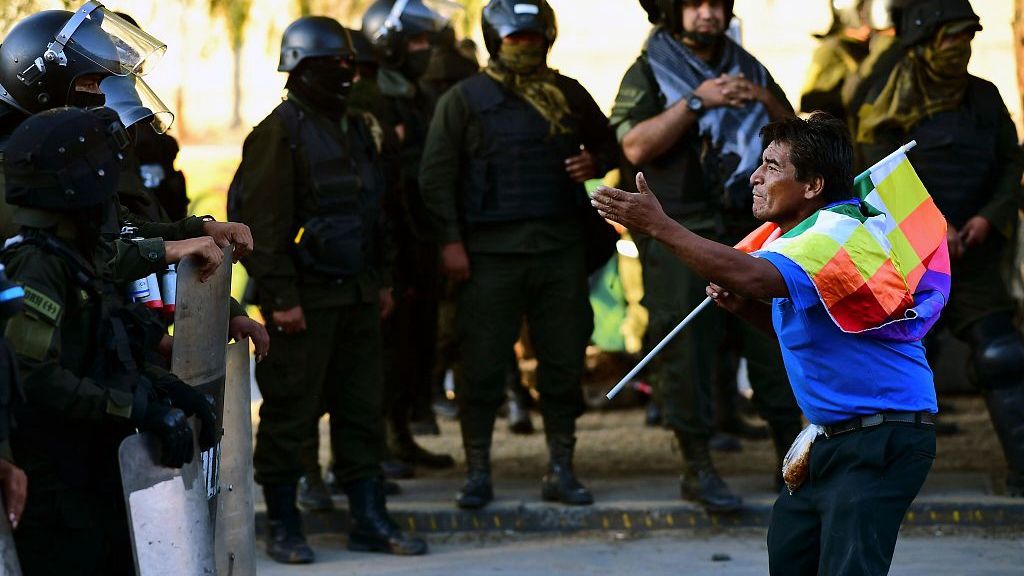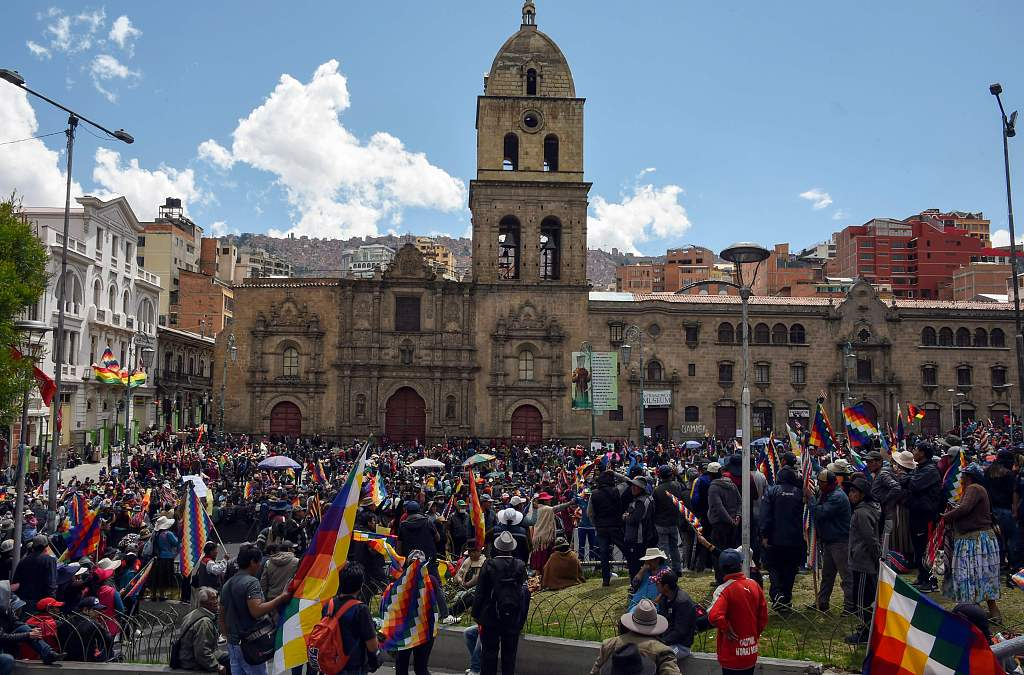
A supporter of Bolivian ex-President Evo Morales faces riot police during a demonstration in Cochabamba, on November 18, 2019. /VCG Photo
A supporter of Bolivian ex-President Evo Morales faces riot police during a demonstration in Cochabamba, on November 18, 2019. /VCG Photo
The crisis in Bolivia showed no signs of stopping on Monday as protests that have killed 20 people in the last week continued, and interim President Jeanine Anez was forced to cancel a trip after receiving a death threat.
Thousands of Bolivian coca farmers marched on Monday to demand Anez's resignation, a week after Evo Morales stepped down as president over allegations of vote rigging in the October 20 election.
Meanwhile, attempts at dialogue between his loyalists and the interim government faltered, with both sides trading accusations of fomenting violence.
Anez, a 52-year-old former opposition senator, assumed the presidency after Morales and his vice president resigned last Sunday.
But she has faced a wave of protests led by Morales supporters who say she was installed in a coup and that her presidency threatens the gains made for the non-white majority in Bolivia during her predecessor's 14 years in office.
Morales is now in Mexico where he has been given asylum.
Deadly clashes
Police on Monday fired tear gas at the protesters in Bolivia's coca-growing highlands who were demanding Morales return to finish his term, which had been due to end in January.
Some farmers threw rocks at security forces and at least 10 protesters were arrested, a Reuters witness said.
The region, long a bastion of Morales' support, was rocked last week by what observers have described as a disproportionate use of force in the town of Sacaba after security forces shot dead up to 10 anti-government protesters.

Supporters of Bolivian ex-President Evo Morales take part in a peaceful demonstration in La Paz on November 18, 2019. /VCG Photo
Supporters of Bolivian ex-President Evo Morales take part in a peaceful demonstration in La Paz on November 18, 2019. /VCG Photo
"What happened in Sacaba weren't clashes, it was a military intervention," the state human rights defender, Ombudsman Nadia Cruz, said on Twitter on Monday, calling for dialogue.
Anez's government has said that some protesters in Sacaba were armed, and that police officers had also been wounded.
The office of the ombudsman, which monitors conflicts in the country of 11 million people, said 20 people have been killed since Morales resigned, more than in the previous three weeks during protests against his government.
Death threat
Anez meanwhile canceled a trip to her home province of Beni province in northeastern Bolivia after a credible threat was made against her life by a "criminal group," interim Interior Minister Arturo Murillo told a news conference, accusing Venezuelans, Cubans, and Colombians of involvement, without providing evidence.
Cuba and Venezuela were close allies of Morales, a socialist. Anez's government has asked Venezuelan diplomats and Cuban doctors to leave the country, accusing them of stoking unrest.
Carlos Mesa, who came in second behind Morales in the disputed October 20 election, has urged Anez to schedule new elections with or without the support of Morales' Movement to Socialism party (MAS), who have a majority in Congress.
"An immediate summons (of elections) is necessary to solidify the legitimacy of President Anez," Mesa said in a videotaped message to his followers on Monday.
An adviser to Anez, presidency minister Jerjes Justiniano, said he supports calling an election by presidential decree if an agreement cannot be reached with MAS.
"We will have an election," he said. "The greatest honor for a Bolivian is to become president of the country but that person must win with votes, not with bullets or boots."
The prospects for dialogue look bleak, however.
Murillo has angered MAS lawmakers by threatening to unveil a list of legislators involved in alleged sedition.
"We don't want to obstruct anything," the head of the Senate, MAS lawmaker Eva Copa, told reporters on Monday. "We don't want more death, we don't want more blood."
Source(s): Reuters